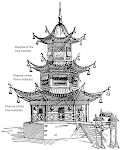From, Nothing is Hidden: The Psychology of Zen Koans by Barry Magid:
Difference and boundary are not words that we normally value in Buddhism; they tend to stand in for everything we imagine we are supposed to overcome in the name of oneness and non separation. But how we handle difference will be one of the hallmarks of our mature practice. We can't eliminate difference and we can't blend opposites into a conflict free synthesis--or mush.
(Book review here.)
Fascinating. The valuation of words is a topic in itself. Generally, in the Zen lineage of the Buddha Dharma, words are distinguished between being living words and dead words. So, are the terms "living" and "dead" themselves words of difference or words of distinction? Is there a difference or a distinction between the words "difference" and "distinction"?
I would say that when we see "distinction as a difference" then that is distinct and different from seeing "difference as a distinction."
This is what the Sixth Ancestor Huineng was teaching in Chapter 10 of the Platform Sutra when talking about the opposites. We usually look at polarities and bifurcations as opposites that are different and separate. But Huineng teaches us that seeing the opposites as a unity whose mutual distinctions are not indicative of actual or fundamental separation is the Dharma view.
Speaking about a difference between two things (dharmas) that concludes fundamental or primary separation is giving voice to dead words. Speaking about distinctions without concluding a separation at the root is giving voice to living words. To paraphrase Huineng, if one is turned around by differences, then that is delusion. If one turns around the differences, then that is the Way.
The root is the one that is equal to zero. The twigs and leaves are distinguished.
As Layman Pang said about the snowflakes in Case 42 of the Blue Cliff Record:
Layman Pang bid adieu to Yaoshan. Shan ordered ten people who were Zen travelers to go together to the main gate to see him off. The Layman pointed to the snow in the middle of the sky and said, "The excellent snow; flake by flake it does not fall at another spot."
At that time there was Zen traveler Quan who asked, "At what spot does it fall?"
The gentleman hit once with a slap.
Quan said, "A Layman too cannot get careless."
The gentleman said, "Like this you call yourself a Zen traveler. Lao-tzu has not liberated your dependence."
Quan said, "Layman how do you make it alive?"
The gentleman again hit once with a slap and said, "The eye sees like a blind person; the mouth speaks like a mute."
Xuedou separately said, "At the first questioning point, yet grab a snowball then hit."
To discourse about it, the old wind-bag Huineng said (from Chapter 10 of The Platform Sutra):
“You who are ranked [as Dharma heirs], if you awaken in accord with this explanation; in accord with this functioning; in accord with this practice; and in accord with these doings; then you do not lose the root of the lineage.
“If there is a person asking you about a meaning, and asks about existence, go to the paired opposite of nonexistence; if asking about nonexistence, go to the paired opposite of existence. If one asks about the worldly, use the paired opposite of the saintly (the sage); if asking about the sage, use the paired opposite of the worldly. The mutual causation of the Way of dualities, gives birth to the meaning of the Middle Way. So, for a single question, a single pair of opposites, and for other questions the single (pair) that accords with this fashion, then you do not lose the principle.
“Suppose there is a person who asks, ‘What is taken for and called darkness?’ Reply and say, ‘Light is the proximate cause and darkness is the contributory cause. When light is ended, then there is darkness. By the means of light, darkness manifests; by the means of darkness, light manifests. (Their) coming and going are mutually proximate causes and become the meaning of the Middle Way.’ Other questions are without exception like this. You who are ranked among the descendants transmitting the Dharma, by relying on this teaching of turning around the characteristics you do not lose the taste of the lineage.”
For this reason too, Zen Master Dongshan set up the Five Positions as another way to deal with this question of the appearance of differences within unity.



No comments:
Post a Comment